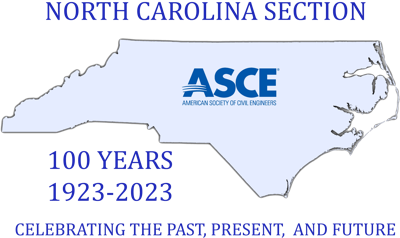Raise the Bar
The North Carolina Section is working diligently to Raise the Bar (RTB) in North Carolina. A RTB committee has been created and includes the following individuals: Grant Autry, Jeffrey Coonse, Ron Geiger, Joe Moore, RD Odell, David Peterson and Al Tice. More volunteers are needed to help with this important effort.
The goal is to incorporate the NCEES Model Law into the North Carolina statutes by 2020.
ASCE's official position, adopted by the Board of Direction on July 12, 2013, is explained on their Policy Statement 465 - Academic Prerequisites for Licensure and Professional Practice page.
The Raise the Bar campaign has prepared several videos to help clarify their stance and objectives.
From: http://www.raisethebarforengineering.org A Commitment to Engineering Excellence The complex challenges facing 21st-century society will require professional engineers (PEs) to advance their technical excellence and professional leadership. The engineering education of the present-a four-year undergraduate degree-will not be sufficient to prepare the licensed professional engineers of the future.
From: http://www.raisethebarforengineering.org/why-raise-bar Engineering licensure boards say "Raise the Bar" The organization representing licensure boards has changed its model state licensure law to require (no earlier than 2020) additional education beyond the bachelor's degree for newly licensed professional engineers. Seeing the Future, Looking Back-Compare today's engineering education to other professions, and learn what's happening to required credit hours.
From: http://www.raisethebarforengineering.org/why-raise-bar A Commitment to Engineering Excellence The complex challenges facing 21st-century society will require professional engineers (PEs) to advance their technical excellence and professional leadership. The engineering education of the present-a four-year undergraduate degree-will not be sufficient to prepare the licensed professional engineers of the future.
From: http://www.raisethebarforengineering.org/why-raise-bar Current education hours are insufficient The credits required to earn the traditional four-year undergraduate engineering degree have decreased significantly. The expanding technical and professional knowledge required by engineers can no longer be learned within a four-year bachelor's degree experience.
From: http://www.raisethebarforengineering.org/why-raise-bar Enhanced leadership skills PEs with enhanced technical, leadership, communications, and business skills will give the profession more effective project teams, generating improved operations and service.
From: http://www.raisethebarforengineering.org/why-raise-bar Society expects more Every other learned profession has recognized the need to require education beyond the bachelor's degree. The time has come for engineering-with its broad impact- to recognize that need as well.

